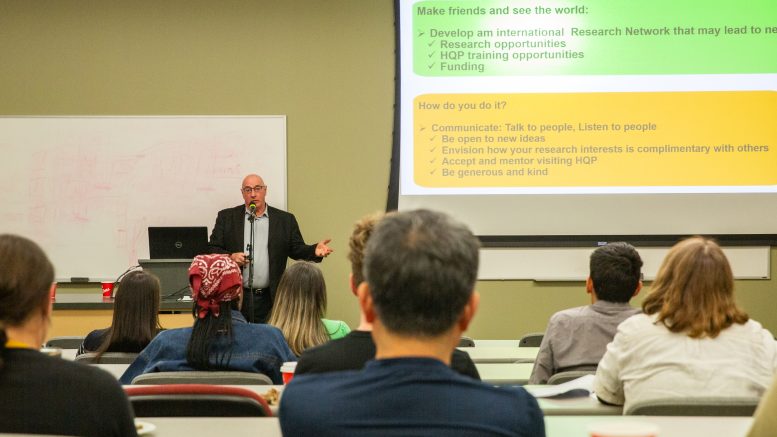David Levin grew up in Winnipeg’s North End, where he played football for the St. John’s Tigers as a middle linebacker.
After graduating high school, a crossroads emerged in his first year at the U of M — Levin had to choose between pursuing football with the Bisons or his academics.
“I did my first year at university, but like most young people, I was pretty dazed and confused,” he said. In his second year, Levin went to the University of Waterloo, where he joined a liberal arts and humanities program and studied philosophy.
During this period, books like The Limits to Growth and Small Is Beautiful resonated with youth looking to change the world. Levin was among them, seeking answers in a world filled with challenges and confusion.
A turning point arrived when he discovered the works of philosopher Karl Popper. Popper’s book The Logic of Scientific Discovery championed empirical falsification through experiments, asserting that evidence should determine the validity of our stories about the universe.
This resonated deeply with Levin, who now embraced the idea that knowledge should evolve based on evidence.
Around the same time, Levin developed a growing fascination with insects while working at an apple orchard for a few summers. He studied the insects that plagued the orchard, trying to determine how to control them without using pesticides.
This experience led him to attend the University of Guelph, where he studied insects and their biological control.
At Guelph, Levin’s focus shifted toward viruses after he encountered a small green caterpillar known as the cabbage worm. His research investigated its interaction with parasitic wasps and viruses.
“Through that, I kind of learned that viruses are really cool,” he said.
After completing his master’s, Levin continued to merge his fascination with insects and viruses in his work. He collected insects in Botswana, Malawi and Kenya and got a job at the veterinary college at the University of Guelph before completing a PhD in bacteria phages at McGill. After graduating, he completed a postdoc in Montreal and went on to work at the University of Victoria.
The researcher would soon encounter the concept of the hydrogen economy and the potential for biological hydrogen production. This venture led him back to the U of M to collaborate with professor in the department of biosystems engineering Nazim Cicek and professor in the department of microbiology Richard Sparling.
Now a professor in the department of biosystems engineering, Levin is involved in research projects focused on biodegradable polymers and microbial and enzymatic degradation of polymers, such as plastics.
His aim is to use enzymes and microbes to engineer a sustainable solution for polymer degradation.
“Basically, allowing the bacteria to use the plastic as a food source and grow and then ultimately, hopefully completely break them down,” he said.
“And then ultimately, we can develop technologies that can be used for engineered processes to degrade plastic.”
Last Wednesday, Levin spoke at a seminar hosted by the faculty of agricultural and food sciences on his international collaborations within the field of bioengineering and biotechnology.
Throughout his career, Levin has actively cultivated international collaborations on a variety of projects, which have taken him to the United States, New Zealand, Italy, Switzerland, France, China and Japan.
Notably, these collaborations have resulted in the acquisition of advanced research tools, such as the unique Titration and Off-Gas Analysis System from Scion Research in New Zealand. This instrument allows real-time monitoring of volatile gas production during fermentation, providing valuable insights into microbial processes.
Levin attributed the success of these partnerships to effective communication and connecting with people on a human level, and stressed the importance of understanding and collaboration in scientific endeavors.
“Everything we do as human beings is about communication,” he said.
“If you’re the smartest person in the world, and if you can’t communicate with anybody, then what good is it?”
Reflecting on his teaching experience, Levin finds great fulfilment in sharing his passion for science with young, motivated students.
“Even if you connect with one person and you see that light bulb go on, then you’ve done your job,” he said.
From football and philosophy to insects and viruses, Levin’s path to biosystems engineering was led by his curiosity. For those still navigating their academic or professional paths, Levin offered some advice.
“Find a passion, follow it.”



